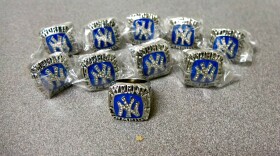Canadian workers for the Blue Water Bridge went on strike this week.
The 45 employees, who all work on the Canadian side of the bridge, are picketing due to contract disputes.
Jocelyn Hall, a media contact with the Michigan Department of Transportation, said the strike could make holiday travel difficult.
“As a contingency plan, a staff of non-unionized employees are filling in those roles and that capacity to keep traffic flowing,” Hall said.
Hall says if there is any traffic backup, it would more than likely be on the Canadian side of the bridge.
“If any issues arise, we'll work with the ... bridge authorities to make sure that they're alleviated as quickly as possible,” she said.
U.S. Customs and Border Protection urges drivers traveling between Michigan and Canada to prepare for holiday traffic this week regardless of the strike.
The CBP recommends that people traveling between Michigan and Canada become familiar with the “Know Before You Go” section of their website to avoid any trouble at the border.
Tips for traveling across the border from the CBP:
Tip #1 – Travelers should familiarize themselves with the “Know Before You Go” section of the CBP website to avoid fines and penalties associated with the importation of prohibited items. Tip #2 – Travelers should prepare for the inspection process before arriving at the inspection booth. Travelers should have their crossing documents available for inspection and should be prepared to declare all items acquired abroad. Tip #3 – Members of the traveling public should consult the CBP website, to monitor border wait times at ports of entry. Information is updated hourly and is useful in planning trips and identifying periods of light traffic/short waits. Tip #4 – During periods of heavy travel, border crossers may wish to consider alternative, less heavily traveled entry routes. Tip #5 – Travelers should plan to build extra time into their trips in the event they cross during periods of exceptionally heavy traffic like holiday weekends. Tip #6 – Know the difference between goods for personal use vs. commercial use. Tip #7 –Do not attempt to bring fruits, meats, dairy/poultry products and firewood into the United States from Canada without first checking whether they are permitted.




